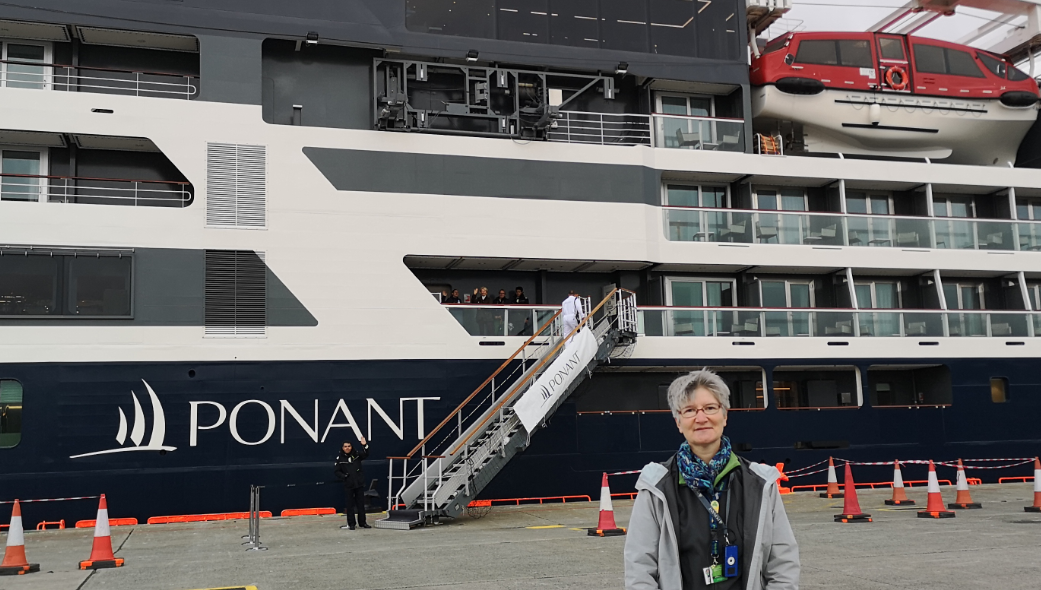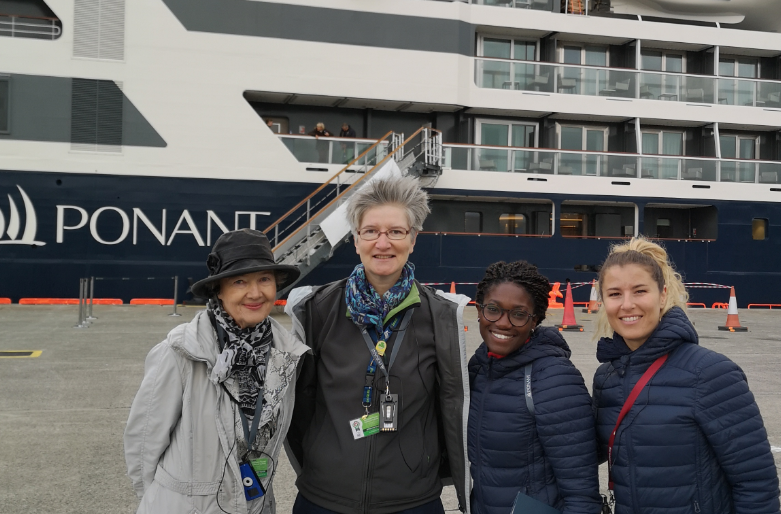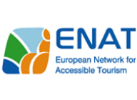FEG Trainer and ATGI Member, based in Ireland
Top 10 Tips for guiding using a translator .... ..

In the busy guiding season, it is often difficult for Tour Operators to find language guides in far-flung, remote areas, such as the Hebrides, in Scotland, or the Aran Islands in Ireland. They may be out on extended tour, or simply not exist. With the increase in cruise ship visits to these remote areas, there is a growing need for language guides for day trips, especially off cruise ships. Don’t be surprised, then, to find, on reporting for work off a cruise ship, that you have been appointed a translator for the day, and will not be speaking directly to your guests. Frequently, this is not a professional translator, but someone from the cruise ship, who is normally an escort. Recently, I was asked to translate for a local guide on Iona and saw, first-hand, what it is like for the translator.

Jessie McDonald with Le Ponant ship, Dumont Durville, and her captain behind. ©Jessie Mcdonald ©FEG
Furthermore, you may have to leave the microphone to the translator, who will translate what you say to the group. Whisperers are often used, especially if there are different nationalities on board, requiring different languages. You may be using a headset and be speaking to, say, English speakers, while your translator might be sitting beside you, with a different headset, set to a different frequency, and speaking to another Nationality. I will shortly be writing about the use of headsets and whisperers, so watch out for that post. Essentially, you simply cannot give as much detail as you would like to. Accept this fact and adapt accordingly! Less is more when you are in a moving coach and someone has to not only to repeat everything you say, but understand it, recall it and find the right words to translate it. Here are my Top 10 Tips for successfully guiding while with a translator.
Top 10 tips for working with translators off coaches.
1. Ask your translator to let you know if you are going too fast for them. Don’t give too much information in one go. They won’t remember it all and it will take twice as long if you have to repeat it!
2. During a Panoramic Tour, you will need to prepare guests as much as possible before you reach the area with most items of interest to point out, so that you can simply point out the feature or building as you pass by. Better still, point them out slightly earlier than you would normally do, as there is no point in your translator talking about something that you have already passed!
3. Don’t give as much detail as you normally would. Remember to keep it short and simple (KISS) Leave out non essential buildings; if clients need more information, they will ask you. If passing a statue, for example, mention who the statue is of, and mention that you will tell them more about them, later on. Remind them to KISS it, too, especially when they are struggling to find a word, and not to worry about translating every word, as long as they get the gist of it.
4. If you have the time, prepare an overview of place names and dates you will be mentioning, as these are very hard for the translator to remember, if they are not familiar with them.

Jessie McDonald and colleagues welcoming cruise ship visitors ©Jessie McDonald ©FEG
5. Make sure you have pen and paper handy, if not, as you can jot down dates, figures or names as you mention them, to help the translator.
6. Bring a map, showing the place names, lakes, castles and other features, as the translator will not be familiar with them.
7. Have a signal for “I need the microphone right now”! Inevitably, they will sometimes be too slow in translating, and you risk missing a TVP, or Top Visual Priority!
8. Don’t use specific dates, unless really necessary; use “in the middle of the C19th”, as frequently, they will have to ask you to repeat the date.
9.. Keep difficult place names to a minimum. Is there really any need to name every mountain, lake, or Earl of Bantry?
10. The escort/translator may not even be translating from or into their own language and will probably not be familiar with specific terminology. Be sure to adjust your language accordingly, and explain what the terms mean: e.g. instead of using “reverse transhumance”, say “winterage, or the seasonal movement of animals from summer to winter pasturage”.
In conclusion: If working off a cruise ship, ask your employer to find out the nationality and language of the clients, and whether there will be a translator, if you don't want a surprise a few minutes before starting your tour. Remember to be patient with your translator, as they have probably had as little warning as you have had about having to translate. Show you are a true professional by rising to the occasion and making the best of a less than ideal situation. Your clients, your employers, and your escort/translator will thank you for it!










